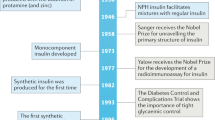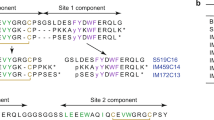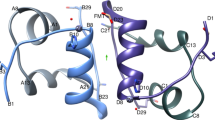Abstract
IN a consideration of the mode of action of insulin it is of some importance to know the equivalent relationship between the amounts of hormone and dextrose, that is, the number of molecules of dextrose equivalent to one molecule of insulin. Up to a recent date this ratio was not known, on account of lack of knowledge of the molecular weight of insulin. A recent communication to NATURE1 from Prof. The Svedberg has, however, provided the necessary information on this point. The molecular weight of 35,100 deduced by Prof. Svedberg is in agreement with the physicochemical behaviour of insulin, and is of the same order as those of ovalbumin and Bence Jones protein.
This is a preview of subscription content, access via your institution
Access options
Subscribe to this journal
Receive 51 print issues and online access
$199.00 per year
only $3.90 per issue
Buy this article
- Purchase on Springer Link
- Instant access to full article PDF
Prices may be subject to local taxes which are calculated during checkout
Similar content being viewed by others
References
Mar. 21, 1931, 438.
Biochem. J., 23, 397 ; 1927
Arch, intern, physiol., 31, 180; 1929.
Author information
Authors and Affiliations
Rights and permissions
About this article
Cite this article
HOWITT, F. The Mode of Action of Insulin. Nature 127, 743–744 (1931). https://doi.org/10.1038/127743c0
Issue Date:
DOI: https://doi.org/10.1038/127743c0
Comments
By submitting a comment you agree to abide by our Terms and Community Guidelines. If you find something abusive or that does not comply with our terms or guidelines please flag it as inappropriate.



